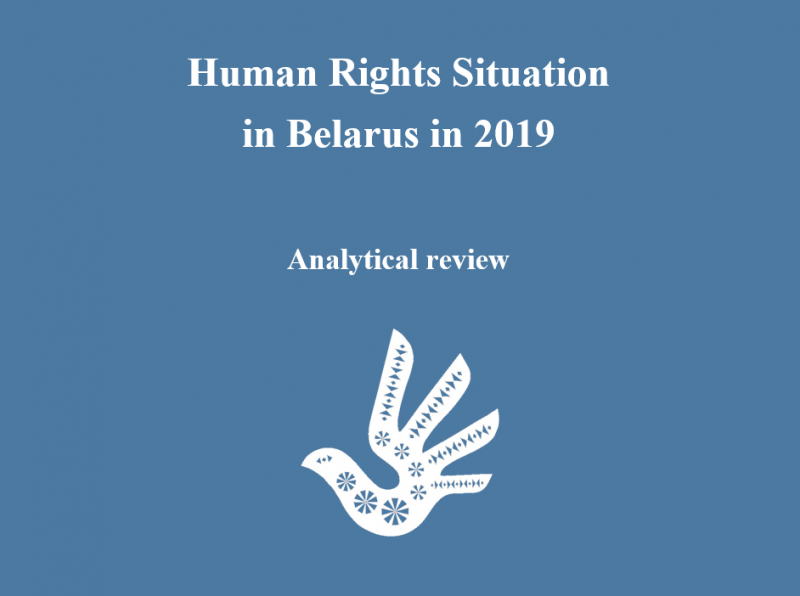Human Rights Situation in Belarus in 2019 Document
SUMMARY
- in spite of a slight decrease in the overall level of repression in the country compared with the previous year, in 2019 Belarus failed to demonstrate any significant systemic changes in the area of civil and political rights, especially at the legislative level, aimed at the qualitative improvement of the human rights situation;
- Belarusian authorities were unable to completely abandon the practice of criminal prosecution on political grounds. According to the Human Rights Center “Viasna”, during the year, politically motivated criminal charges were brought against seven persons (Maryna Zolatava, Siarhei Piatrukhin, Aliaksandr Kabanau, Andrei Pavuk, Maisei Mazko, Dzianis Mazko, and Dzmitry Paliyenka). Three of them (Zolatava, Piatrukhin, and Paliyenka) were sentenced by the courts to punishments not involving deprivation of liberty;
- despite the absence of new political prisoners in 2019, political prisoner Mikhail Zhamchuzhny continued to serve his sentence in prison. Henadz Fiadynich and Ihar Komlik, leaders of the independent trade union REP, continued to be confined to their apartments as a result of house imprisonment imposed back in 2018. Their sentencing was found politically motivated by both the Belarusian and international human rights organizations;
- elections to the House of Representatives of the National Assembly of the 7th convocation, which took place on November 17, 2019, were not recognized as free and democratic by either the independent national observers or the international election observation mission of the OSCE ODIHR;
- the parliamentary elections failed to result in a significant increase in repression during campaigning, but led to new cases of administrative prosecution in the aftermath of the vote. The repression targeted participants in peaceful assemblies held during the electoral campaign, as well as participants in a series of protests against so-called “advanced integration” with Russia, which were held in Minsk, Hrodna, Pinsk, and Lida in December 2019;
- in 2019, Article 23.34 of the Administrative Code (illegal protesting) affected at least 121 persons in 162 cases. 13 persons were sentenced to short terms of detention. In addition, 3 persons were convicted under Article 23.4 of the Administrative Code (disobedience to a lawful request of an official) for the exercise of the right to peaceful assembly and expression in street protests, and 16 persons were convicted under Article 17.1 (disorderly conduct) in 25 documented cases, most of which were simultaneously qualified under Art. 23.4; two of them were sentenced to detention. 11 persons (44 cases) were fined for violating traffic rules. Thus, at least 151 people in at least 234 documented cases were administratively convicted for exercising their right to peaceful assembly, freedom of opinion and expression;
- during the year, there were numerous cases of persecution of bloggers and journalists of independent media in connection with the exercise of their professional activities. According to the Human Rights Center “Viasna”, there were 45 documented cases of arbitrary imposition of administrative penalties against 20 journalists and bloggers under Part 2, Art. 22.9 of the Administrative Code. The total amount of fines exceeded 43,000 Belarusian rubles;
- the year 2019 did not see a significant change in the situation with the rights to security of person, freedom from torture, cruel, inhuman and degrading treatment;
- in spite of the ongoing dialogue with the EU and the PACE on the issue of the death penalty and repeated calls for a moratorium on executions, Belarus continued to apply capital punishment in 2019. In 2019, three new death sentences were handed down, and three earlier sentences were executed;
- throughout the year, the country’s authorities made an extensive use of forced labor by persons confined to so-called LTPs (labor and therapy centers), parents obliged to reimburse the cost of government child custody, as well as the unpaid labor of army conscripts, university students and employees of government-owned enterprises and institutions involved in harvesting crops and community cleanups.


















